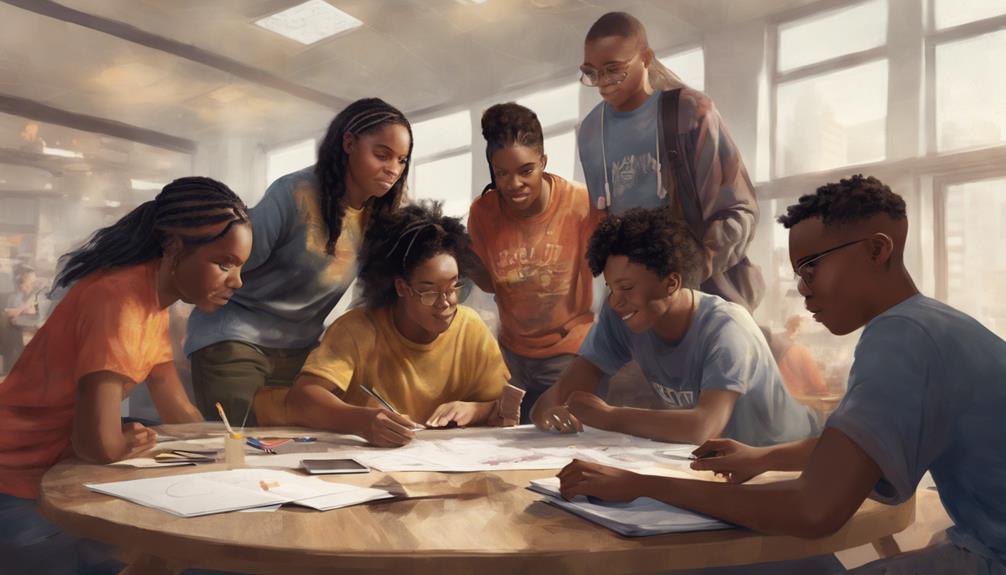In the realm of education, teamwork stands as a cornerstone for fostering holistic learning experiences. The significance of collaboration amongst learners transcends mere interaction; it delves into the intricacies of cognitive development, social integration, and adaptive problem-solving. By unraveling the layers of why teamwork is pivotal in the landscape of learning, we unearth a myriad of benefits that pave the way for enhanced academic growth and personal development. But what lies at the core of this interconnected web of shared knowledge and mutual support?
Key Takeaways
- Enhances critical thinking and problem-solving skills through diverse perspectives and collaborative discussions.
- Cultivates leadership abilities by practicing effective communication, teamwork, and understanding of group dynamics.
- Stimulates cognitive growth and creativity by considering different approaches and viewpoints in team environments.
- Prepares individuals for future challenges by fostering adaptability, empathy, and innovative solutions through teamwork.
Fosters Critical Thinking Skills
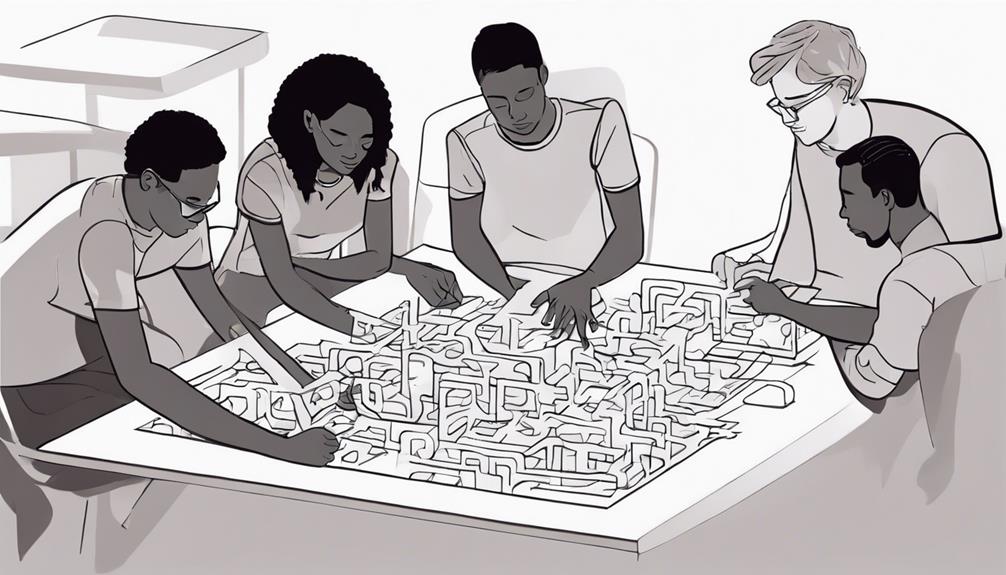
Teamwork in learning environments serves as a catalyst for the development of critical thinking skills, fostering the ability to analyze information from diverse perspectives and formulate effective solutions. Through collaboration, students enhance their critical thinking skills by engaging in discussions, evaluating various viewpoints, and collectively solving complex problems. Teamwork skills are honed as individuals communicate, share ideas, and work together towards a common goal. This collaborative process encourages students to think critically by considering different approaches, weighing evidence, and making reasoned judgments.
Moreover, teamwork fosters communication skills essential for expressing thoughts clearly, actively listening to others, and articulating ideas persuasively. By participating in group activities, students learn to communicate effectively, exchange feedback, and engage in constructive dialogue. These interactions not only enhance critical thinking but also promote the development of communication skills crucial for succeeding in academic and professional environments. In essence, teamwork creates a platform for students to sharpen their critical thinking and communication skills, preparing them for future challenges where these abilities are paramount.
Encourages Diverse Perspectives
Encouraging diverse perspectives in collaborative learning environments cultivates a rich tapestry of ideas and insights, fostering innovation and critical thinking among participants. When teamwork embraces a variety of viewpoints, it leads to a more comprehensive understanding of complex issues. Here are some key reasons why diverse perspectives are essential in teamwork:
- Enhanced creativity: Different backgrounds and experiences spark creativity within the team, leading to innovative solutions and ideas.
- Improved problem-solving: Diverse perspectives enable teams to consider various angles when tackling challenges, resulting in more effective problem-solving approaches.
- Broadened learning: Embracing diversity in teamwork enhances the overall learning experience, providing participants with a well-rounded understanding of different viewpoints.
- Increased adaptability: Exposure to diverse perspectives helps individuals become more adaptable and open-minded in their approaches to tasks and projects.
- Cultivation of empathy: Interacting with team members from diverse backgrounds fosters empathy and understanding, creating a more inclusive and supportive learning environment.
Enhances Problem-Solving Abilities
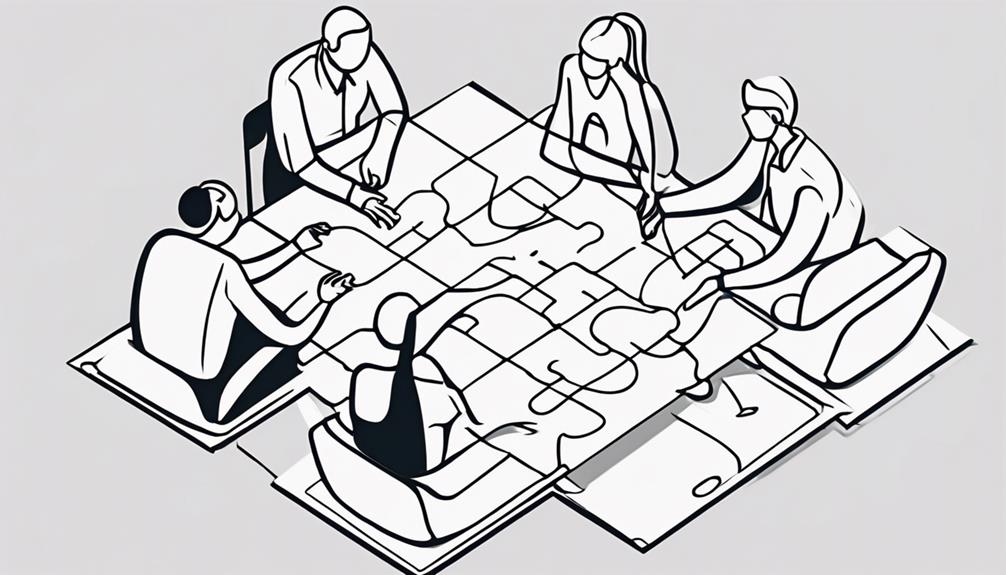
Teamwork serves as a catalyst for enhancing problem-solving abilities through the integration of diverse perspectives and expertise. Collaborative efforts within a team environment often lead to the generation of innovative solutions to intricate problems. By sharing ideas and strategies, individuals in a team setting can collectively improve their critical thinking skills and foster creative approaches to tackling challenges.
Boosts Critical Thinking Skills
Collaboration within a group setting is known to play a pivotal role in enhancing critical thinking skills, thereby boosting problem-solving abilities among students. Working in teams fosters the following critical thinking skills:
- Encourages analysis of different perspectives.
- Challenges students to think critically and creatively.
- Promotes logical reasoning and decision-making.
- Enhances the ability to evaluate information and make informed judgments.
- Stimulates cognitive growth and improves the capacity to tackle challenging academic tasks.
Through these processes, students not only develop their critical thinking abilities but also acquire the necessary skills to navigate complex problems effectively. Teamwork provides a platform for students to engage in meaningful discussions, share ideas, and collectively work towards innovative solutions.
Fosters Innovative Solutions
By fostering an environment that embraces diverse perspectives and combines varied expertise, teamwork cultivates a fertile ground for the generation of innovative solutions, thereby enhancing problem-solving abilities. Collaborative problem-solving within teams allows for the integration of different viewpoints and approaches, leading to creative and effective outcomes. This diversity of perspectives encourages out-of-the-box thinking, enabling team members to explore unconventional solutions to complex problems. By leveraging the strengths of each team member, groups can tackle challenges with innovative strategies that may not have been possible individually. Effective teamwork enhances the ability to address issues from multiple angles, fostering a culture of innovation and creativity within the problem-solving process.
Encourages Diverse Perspectives
Embracing diverse perspectives within a team setting enhances problem-solving abilities by stimulating critical thinking and challenging established assumptions. Effective communication and collaboration among individuals with varied viewpoints lead to more innovative and effective solutions to complex problems. Different perspectives encourage a thorough analysis of issues, fostering well-rounded solutions. Understanding and respect for diverse viewpoints create a conducive environment for idea generation and creativity. Team members bring unique skills and expertise to the table, contributing to a comprehensive approach in tackling challenges. Ultimately, considering diverse perspectives not only enhances problem-solving abilities but also cultivates a culture of inclusivity and openness within the team.
Boosts Creativity and Innovation
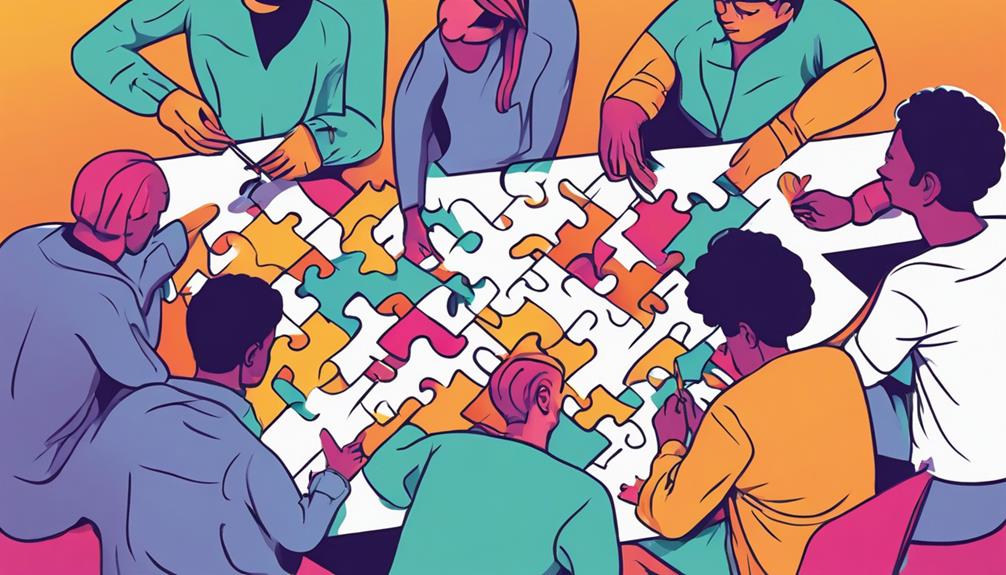
The amalgamation of diverse perspectives within a team setting cultivates an environment that nurtures creativity and drives innovation. Collaborative environments spark creativity by combining different skill sets and experiences, leading to the generation of innovative solutions. When individuals with varying backgrounds and expertise come together to work towards a common goal, they bring forth a plethora of ideas and approaches that may not have been possible in a solo setting. This synergy in teamwork fosters a culture of innovation where novel concepts are not only accepted but encouraged.
To further illustrate the impact of teamwork on creativity and innovation, consider the following table:
| Benefits of Teamwork in Creativity and Innovation |
|---|
| Encourages sharing of diverse perspectives and ideas |
| Combines different skill sets and experiences |
| Fosters a culture of innovation and exploration |
Through collaboration, team members inspire each other to think outside the box, challenge existing norms, and develop unique solutions. By encouraging creativity within a team dynamic, the outcomes tend to be more inventive and forward-thinking, pushing the boundaries of what is possible in the realm of learning and problem-solving.
Cultivates Leadership Qualities
Teamwork plays a crucial role in developing leadership qualities by allowing individuals to practice decision-making, problem-solving, and communication skills within a team setting. Leading a team provides individuals with the opportunity to inspire and motivate team members towards achieving common objectives, fostering essential attributes of effective leadership. By taking on leadership roles in teamwork, individuals can enhance their confidence in their leadership abilities and gain a deeper understanding of team dynamics, collaboration, and group management, all vital components of successful leadership.
Develops Communication Skills
By engaging in collaborative learning environments, individuals hone their communication skills while concurrently fostering the development of leadership qualities. Effective communication is enhanced through active listening and the articulation of ideas. Teamwork cultivates leadership qualities by teaching individuals to coordinate tasks, delegate responsibilities, and motivate team members. Through collaboration, students learn to work effectively with diverse groups, preparing them for real-world challenges. Team activities also help students navigate different communication styles, resolve conflicts, and adapt to varying perspectives. This participation fosters empathy, understanding, and respect among peers, leading to enhanced collaboration and mutual support.
- Promotes active listening and clear expression of ideas
- Cultivates leadership qualities by coordinating tasks and motivating team members
- Enhances ability to work effectively with diverse groups
- Helps navigate different communication styles and resolve conflicts
- Fosters empathy, understanding, and respect among peers
Fosters Problem-Solving Abilities
Enhancing problem-solving abilities through teamwork fosters the development of leadership qualities in individuals. By working collaboratively, team members can effectively leverage their diverse ideas and opinions to tackle complex challenges. Engaging in group discussions and brainstorming sessions within a team setting enhances critical thinking skills, allowing individuals to analyze problems from multiple perspectives. Moreover, sharing responsibilities in a team environment cultivates decision-making skills, empowering individuals to make informed choices. Encouraging team members to take initiative not only contributes to more proactive problem-solving approaches but also nurtures their leadership potential. Overall, fostering problem-solving abilities through teamwork not only enhances the efficiency of finding solutions but also plays a significant role in developing essential leadership qualities in individuals.
Strengthens Teamwork Dynamics
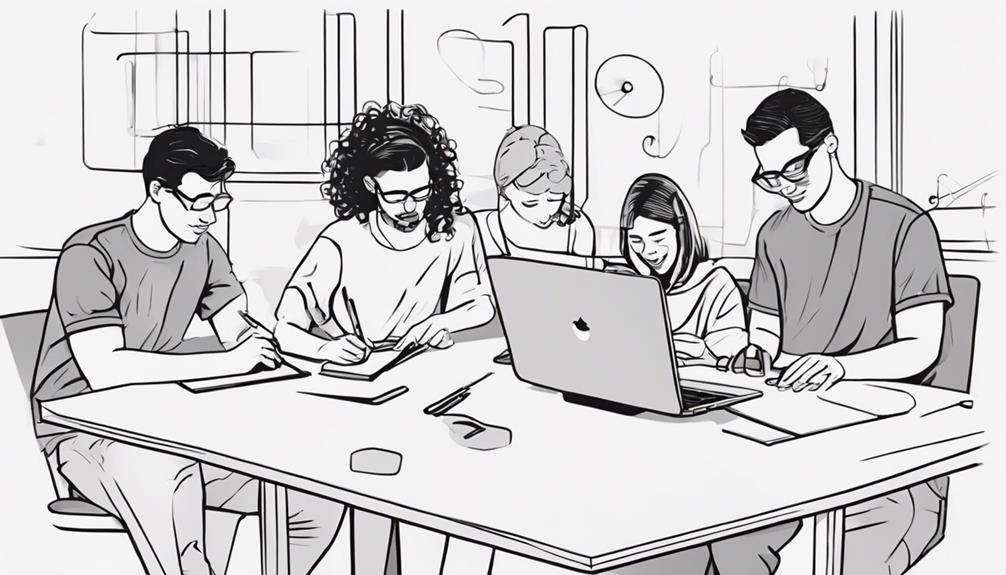
Strengthening collaborative interactions within learning environments is pivotal for fostering interconnectedness and support among students. Effective teamwork dynamics go beyond completing tasks; they help students develop essential skills for their personal and academic growth. The importance of teamwork in learning is underscored by its ability to cultivate a team that genuinely cares for each other's well-being.
- Enhances Communication Skills: Teamwork dynamics improve students' ability to communicate effectively, both verbally and non-verbally.
- Builds Empathy and Social Skills: Working in teams encourages students to understand and appreciate diverse perspectives, fostering empathy and social skills.
- Promotes Engagement and Motivation: Positive teamwork dynamics create an engaging environment that motivates students to actively participate in learning activities.
- Fosters Sense of Belonging: Strong teamwork dynamics create a supportive community where students feel connected and valued.
- Boosts Academic Success: Students who collaborate well in teams often experience improved academic performance due to enhanced problem-solving abilities and shared knowledge.
Improves Communication Effectiveness
Improving communication effectiveness through teamwork is a fundamental aspect of enhancing collaborative dynamics within learning environments. Team activities provide a platform for individuals to develop essential communication and social skills. By engaging in teamwork, individuals learn the art of active listening and expressing ideas clearly, which are pivotal components of effective communication. Meaningful dialogues that occur within a team setting foster a deeper level of understanding among team members, thereby improving overall communication effectiveness.
Moreover, participating in teamwork helps individuals articulate their thoughts and opinions in a coherent manner. This not only benefits the individual but also contributes to the team's success by ensuring that ideas are conveyed effectively. Additionally, strong communication skills acquired through teamwork enable individuals to better comprehend the perspectives of coaches, teammates, and opponents, leading to improved interactions and performance outcomes. Learning to communicate respectfully within a team setting also promotes positive relationships, collaboration, and mutual understanding among team members.
Builds Mutual Respect and Trust
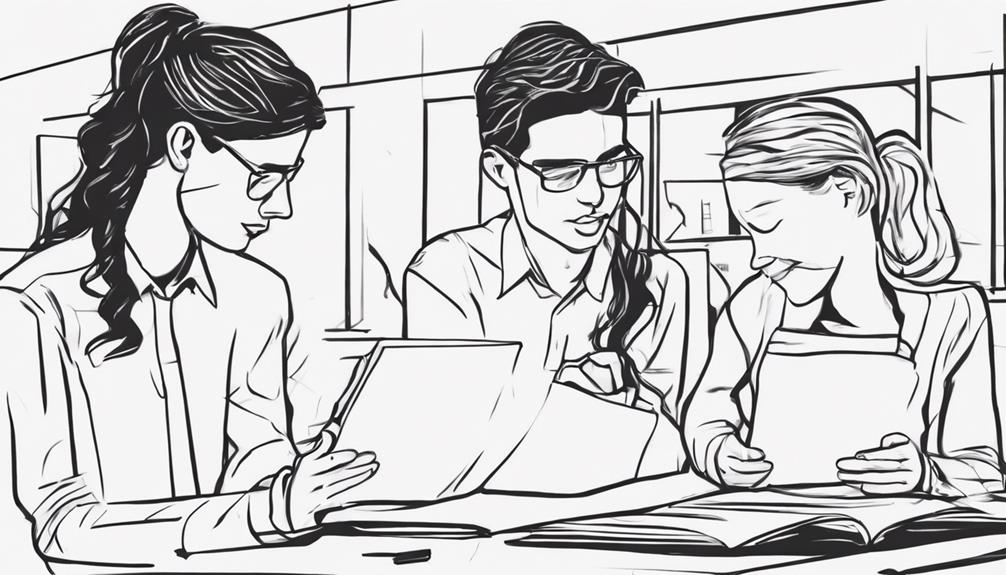
Effective teamwork in learning environments plays a crucial role in building mutual respect and trust among individuals. By collaborating with peers, students develop a deeper appreciation for diverse perspectives, fostering a sense of trust in each other's abilities. This trust forms the foundation for enhanced cooperation, leading to stronger interpersonal relationships and successful learning outcomes.
Fosters Collaboration Skills
Collaboration skills are cultivated through teamwork in learning, fostering an environment where mutual respect and trust among students can flourish. This collaboration not only enhances academic performance but also shapes individuals for real-world situations where teamwork is essential. Here are key aspects of how teamwork fosters collaboration skills, mutual respect, and trust:
- Encourages collective effort towards common goals.
- Values diverse perspectives and contributions.
- Builds a supportive environment for idea-sharing.
- Enhances problem-solving through combined skills.
- Improves communication and interpersonal relationships.
Through these collaborative experiences, students learn to appreciate each other's strengths, communicate effectively, and trust in their peers, laying a foundation for successful teamwork and mutual growth.
Enhances Communication Abilities
Enhancing communication abilities within a team setting not only fosters mutual respect and trust but also plays a pivotal role in strengthening collaborative dynamics. Effective teamwork hinges on active listening and developing effective speaking skills. By honing these communication abilities, team members can better understand each other's perspectives and work towards common goals more efficiently. This fosters an environment where everyone's opinions are valued, leading to mutual respect among team members. Trust is built through transparent and open communication channels, creating a foundation for strong collaborative efforts. Developing these skills not only improves how ideas are expressed but also enhances the overall efficiency and effectiveness of teamwork.
| Communication Abilities | Active Listening | Effective Speaking Skills |
|---|---|---|
| Promotes understanding and empathy | Encourages listening without judgment | Enhances clarity and articulation |
| Values diverse perspectives | Facilitates clear communication | Improves confidence in expressing ideas |
| Fosters mutual respect | Strengthens focus on speaker | Enhances persuasive abilities |
| Builds trust through transparency | Promotes engagement in conversations | Encourages concise and effective communication |
| Strengthens collaborative dynamics | Enhances retention of information | Facilitates constructive discussions |
Strengthens Interpersonal Relationships
How does teamwork in learning contribute to the establishment of mutual respect and trust among students? Teamwork in learning strengthens interpersonal relationships by fostering mutual respect and trust among students. It creates a supportive environment where students feel valued and appreciated for their contributions. Building mutual respect through teamwork encourages open communication and collaboration among peers. Trust developed in a team setting leads to effective problem-solving and shared responsibilities. Strong interpersonal relationships formed through teamwork enhance the overall learning experience and academic success. Through these interactions, students learn to work together, respect each other's opinions, and trust in their peers' abilities, creating a positive and productive learning environment.
Shares Workload and Responsibilities
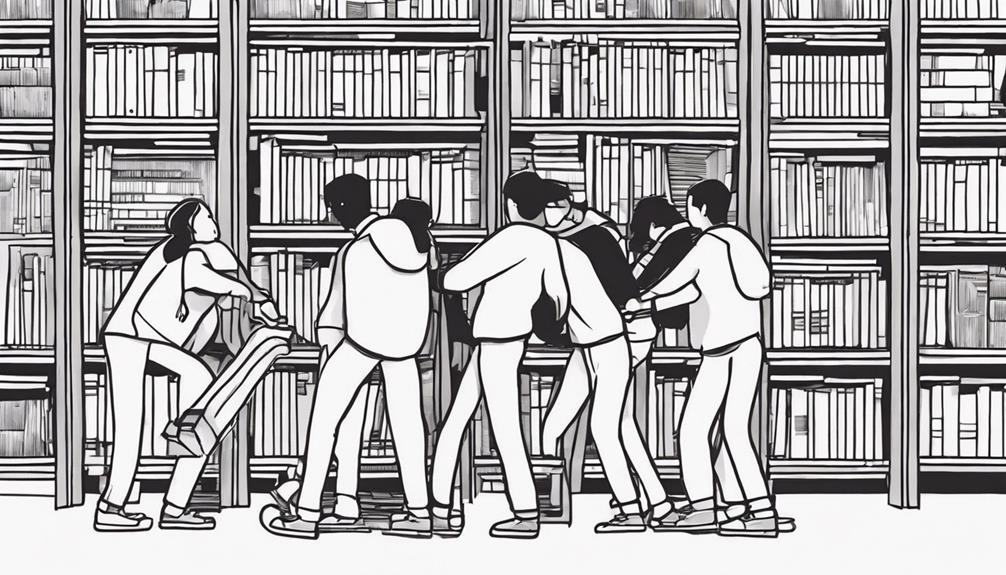
Through the distribution of tasks and responsibilities among team members, teamwork effectively shares the workload and promotes efficiency in task completion. Dividing work ensures that no individual is overwhelmed, leading to a balanced distribution of responsibilities within the team. This practice not only prevents burnout but also enhances the quality of work by allowing each team member to focus on their assigned tasks. Moreover, sharing the workload fosters a collaborative environment where team members can support each other, share knowledge, and collectively work towards achieving common goals. The following table illustrates how sharing workload and responsibilities in teamwork can lead to increased efficiency and effective task management:
| Benefits of Sharing Workload and Responsibilities |
|---|
| Prevents individual overload |
| Promotes balanced task distribution |
| Enhances overall team efficiency |
Enhances Time Management Skills
Developing effective time management skills is a critical outcome of engaging in teamwork, particularly in educational settings. When working as a team, individuals are presented with opportunities to develop their time management skills in various ways:
- Task Prioritization: Teamwork helps students learn how to prioritize tasks and allocate time effectively.
- Deadline Management: Collaborating with others teaches students to coordinate schedules and meet deadlines.
- Responsibility Division: Working in a team encourages students to divide responsibilities and manage time efficiently.
- Real-World Practice: Team projects provide opportunities for students to practice time management skills in a real-world setting.
- Balancing Commitments: Learning to work with others enhances students' ability to balance multiple tasks and commitments.
Through these experiences, individuals not only enhance their ability to manage time effectively but also acquire essential skills that are beneficial both academically and professionally. Time management, when honed through teamwork, becomes a valuable asset that can support success in various aspects of life.
Promotes Peer Learning and Support
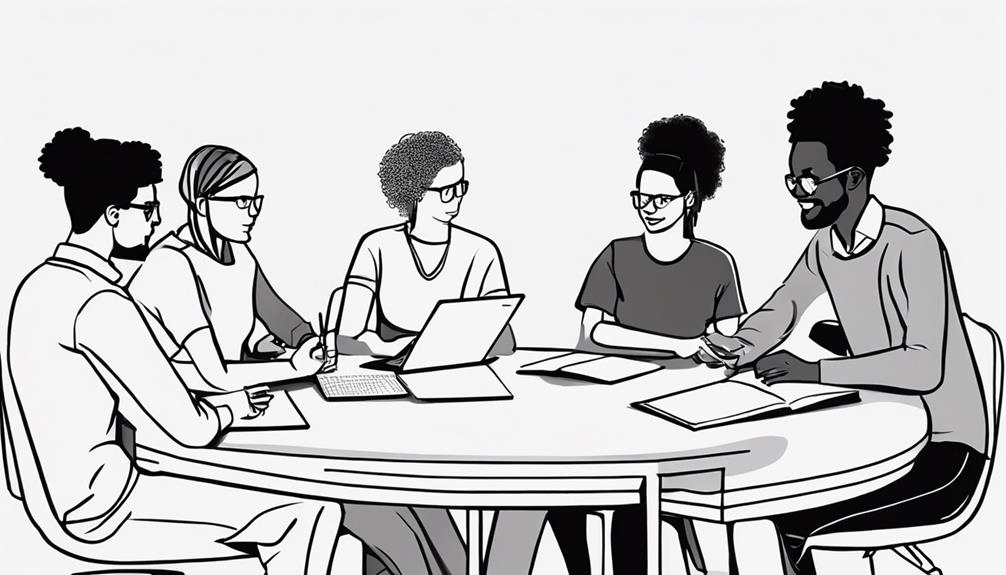
Peer learning within a team setting is crucial for knowledge exchange and comprehension of intricate subjects. The support and assistance offered by peers not only enhance confidence but also drive students to conquer academic hurdles. Collaborative teamwork cultivates an environment where active engagement and mutual learning thrive, fostering a culture of collective achievement.
Peer Collaboration Boosts Learning
Engaging in collaborative learning with fellow students significantly enhances the overall learning experience by fostering active participation and knowledge exchange. Peer collaboration in teamwork promotes active learning and knowledge sharing among students. Working together with peers enhances problem-solving skills and critical thinking abilities. Peer support in teamwork boosts motivation and engagement in the learning process. Collaborating with classmates helps students gain different perspectives and insights on academic topics. Teamwork encourages students to take ownership of their learning and responsibilities within a group setting.
Supportive Teamwork Enhances Understanding
Collaborative teamwork in educational settings plays a pivotal role in enhancing students' understanding through the facilitation of peer learning and support. Supportive teamwork promotes peer learning by enabling the exchange of knowledge, perspectives, and insights among students. Engaging in teamwork not only enhances comprehension but also encourages students to work together to solve problems and explore diverse approaches. This collaborative environment provides a platform for students to ask questions, seek clarification, and receive assistance from their peers, fostering a sense of community and belonging. Peer support within teamwork not only boosts active participation and confidence but also aids in the development of critical thinking skills. Through shared experiences and discussions, students can deepen their understanding of the subject matter.
| Benefits of Supportive Teamwork | ||
|---|---|---|
| Promotes Peer Learning | Enhances Comprehension | Fosters Critical Thinking |
Fosters a Sense of Belonging
Through the implementation of teamwork in learning environments, a profound sense of belonging and inclusivity is cultivated among students. Teamwork not only enhances academic understanding but also plays a crucial role in creating a supportive and inclusive atmosphere where every student feels valued and accepted. This sense of belonging is essential for students to thrive and engage actively in the learning process. Here are five key ways in which teamwork fosters a sense of belonging:
- Promotes Collaboration: Working in teams allows students to collaborate with their peers, fostering connections and building strong relationships.
- Boosts Confidence: Feeling part of a team boosts students' confidence, making them more willing to participate and share their ideas.
- Enhances Motivation: The support and encouragement received within a team environment motivate students to learn and achieve their academic goals.
- Improves Well-being: A sense of belonging through teamwork enhances students' overall well-being, leading to a more positive learning experience.
- Increases Engagement: Students who feel included and supported are more likely to engage actively in classroom activities, discussions, and projects.
Celebrates Shared Achievements
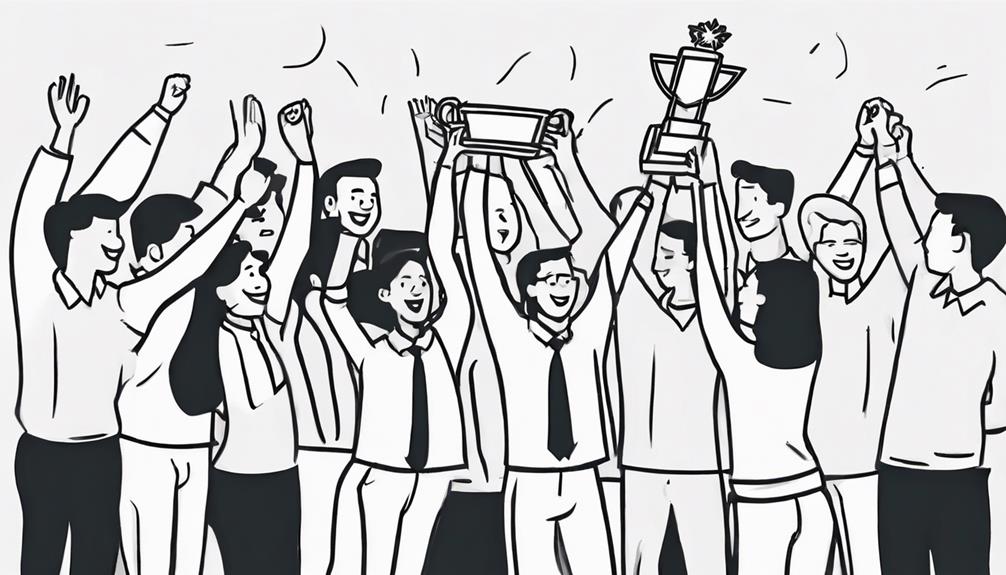
Recognizing and celebrating shared achievements within a team setting is integral to fostering a sense of unity and accomplishment among its members. By acknowledging the contributions of each team member, a positive and supportive environment is cultivated, strengthening the bonds among team members. Celebrating milestones and goals achieved together not only boosts morale and motivation but also builds camaraderie within the team. Reflecting on shared accomplishments reinforces the value of collaboration and cooperation in achieving common objectives.
| Benefits of Celebrating Shared Achievements | Description |
|---|---|
| Promotes Unity and Accomplishment | Recognizing shared successes enhances team spirit and morale. |
| Strengthens Bonds Among Team Members | Celebrating milestones fosters a supportive and cohesive team environment. |
| Reinforces Value of Collaboration | Reflecting on achievements highlights the importance of working together towards common goals. |
Prepares for Real-World Collaboration
Teamwork in educational environments plays a pivotal role in equipping students with the necessary skills and mindset to effectively collaborate in real-world professional settings. Through teamwork, students learn how to listen, communicate effectively, and work with others, which are essential skills for successful collaboration in the professional world. The following points highlight how teamwork in learning prepares students for real-world collaboration:
- Students develop the ability to listen actively and understand diverse viewpoints, fostering better communication skills.
- Working in teams helps students navigate complex group dynamics, leading to improved problem-solving abilities.
- Collaboration encourages students to practice conflict resolution techniques, essential for handling disagreements in professional settings.
- Valuing diverse perspectives in teamwork prepares students to appreciate different ideas and backgrounds, crucial for successful collaboration in the real world.
- Excelling in teamwork equips students with the cooperation and communication skills necessary for thriving in careers that require extensive collaboration.
Frequently Asked Questions
Why Is It Important to Learn Teamwork?
Learning teamwork is important as it enhances problem-solving abilities, communication skills, critical thinking, and collaboration. By engaging in teamwork, individuals receive peer support, which boosts motivation and productivity. Understanding how to work effectively in a team setting is crucial for achieving common goals and achieving success in collaborative environments. Teamwork fosters a sense of shared responsibility and accountability, leading to improved outcomes and overall performance.
Why Is Teamwork Important in the Classroom?
Group dynamics play a pivotal role in fostering effective problem-solving skills within a classroom setting. Through teamwork, students benefit from peer support, driving higher engagement levels and deeper learning. Furthermore, collaboration enhances communication and social skills, crucial for future success in various career paths. Emphasizing teamwork in the classroom not only enriches the learning experience but also equips students with essential interpersonal abilities for their professional journeys.
Why Is Teamwork and Collaboration Important in Learning?
Teamwork and collaboration in learning are crucial for fostering problem-solving skills, enhancing critical thinking, and promoting effective communication. Students engaging in collaborative tasks develop social skills and emotional intelligence, leading to a deeper understanding of diverse perspectives. Additionally, teamwork encourages creativity and innovation, pushing learners to think outside the box. This collaborative approach not only benefits individual growth but also creates a supportive community environment conducive to learning.
Why Is It Important for Students to Work in Teams?
Working in teams is crucial for students as it enhances problem-solving skills, communication skills, critical thinking, social skills, collaboration, and creativity. Through teamwork, students learn to navigate diverse perspectives, brainstorm solutions collectively, and work towards common goals. These experiences prepare students for real-world scenarios where collaboration is essential. Ultimately, teamwork fosters a range of skills that are vital for success in academic, professional, and personal spheres.
Conclusion
In conclusion, teamwork plays a vital role in enhancing learning outcomes by fostering critical thinking skills, encouraging diverse perspectives, and promoting collaboration. It boosts problem-solving abilities, creativity, and leadership qualities, while also cultivating a sense of belonging and celebrating shared achievements. Ultimately, teamwork prepares individuals for real-world collaboration, making them more successful and productive in their endeavors. As the saying goes, "Teamwork makes the dream work." "and together we can achieve greatness."
